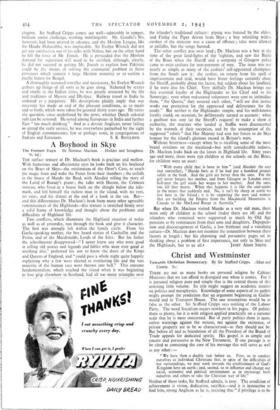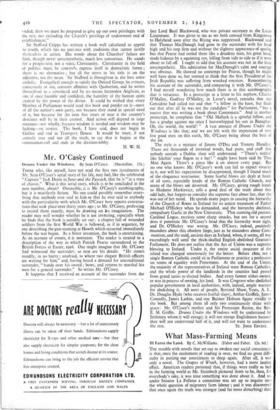Christ and Westminster
THERE are not so many books on personal religion by Cabinet Ministers that we an afford to disregard one when it comes. For it is personal religion pure and simple that is the central theme of this arresting little volume. Its title might suggest an academic treatise on politics and metaphysics. Knowledge of some aspects of its author might prompt the prediction that an argument beginning in Galilee would end in Transport House. The one assumption would be as false as the other. Sir Stafford Cripps says nothing of the Labour Party. The word Socialism occurs nowhere in his pages. Of politics there is plenty, for it is with religion applied practically on a national scale that he is most concerned. But of party politics there is none, unless warnings against the misuse, not against the existence, of private property are to be so characterised—as they should not be. But before all and as foundation of all the President of the Board of Trade appeals for dedicated spirits. His gospel is as simple and sincere and persuasive as the New Testament. If one passage is to be cited as containing the core of his message this will serve as well
as any other :—
" We have then a double task before us. First, so to conduct ourselves as individual Christians that, in spite of the difficulties of our surroundings, we may work towards the establishment of God's Kingdom here on earth ; and, second, so to influence and change our social, economic and political environment as to encourage both ourselves and others to take the Christian way of life."
Neither of those tasks, Sir Stafford admits, is easy. The condition of achievement is vision, dedication, sacrifice,—and it is instructive to find him, strong Anglican as he is, insisting that " if privilege is to be ended, then we must be prepared to give up our own privileges with the rest, not excluding the Church's privilege of endowment and of establishment."
Sir Stafford Cripps has written a book well calculated to appeal to youth, which has no patience with traditions that cannot justify them5elves in action. His words about the Churches' failure are firm, though never unsympathetic, much less censorious. He stands for a progressive, not a static, Christianity. Christianity in the field of politics must, he contends, express itself in democratic forms ; there is no alternative ; but all the stress in his title is on the adjective, not the noun. Sir Stafford is throughout in the best sense catholic. Evangelical enough to satisfy the Oxford Group, he evinces, consciously or not, constant affinities with Quakerism, and he writes throughout as a convinced and by no means heterodox Anglican, as one at once humble and confident, the humility of the human spirit exalted by the power of the divine. It could be wished that every Member of Parliament would read this book and ponder on it—most of all the author's own party, not because they stand in special need of it, but because for the next five years or near it the country's destinies will be in their control. And action will depend in large measure—not wholly, because wisdom is needed and wisdom may be lacking—on motive. The book, I have said, does not begin in Galilee and end in Transpoq House. It would be truer, if not entirely true and not all the truth, to say that it begins at the communion-rail and ends in the division-lobby.
H. W. H.































 Previous page
Previous page